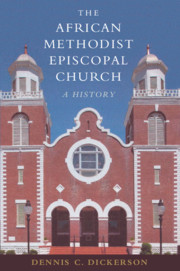Book contents
- The African Methodist Episcopal Church
- The African Methodist Episcopal Church
- Copyright page
- Dedication
- Contents
- Illustrations
- Preface
- Introduction
- 1 Richard Allen and the Rise of African Methodism in the Atlantic World, 1760–1831
- 2 The Freedom Church, 1831–1861
- 3 “Welcome to the Ransomed,” 1861–1880
- 4 A Denomination in the Diaspora, 1880–1916
- 5 Into the Second Century: Migration, Depression, and War, 1916–1945
- 6 Freedom Now! Civil Rights, Black Power, and Anticolonial Insurgencies, 1945–1976
- 7 Becoming a Global Church, 1976–2018
- Epilogue
- Appendix The Bishops of the African Methodist Episcopal Church, 1816–2018
- Bibliography
- Index
2 - The Freedom Church, 1831–1861
Published online by Cambridge University Press: 20 December 2019
- The African Methodist Episcopal Church
- The African Methodist Episcopal Church
- Copyright page
- Dedication
- Contents
- Illustrations
- Preface
- Introduction
- 1 Richard Allen and the Rise of African Methodism in the Atlantic World, 1760–1831
- 2 The Freedom Church, 1831–1861
- 3 “Welcome to the Ransomed,” 1861–1880
- 4 A Denomination in the Diaspora, 1880–1916
- 5 Into the Second Century: Migration, Depression, and War, 1916–1945
- 6 Freedom Now! Civil Rights, Black Power, and Anticolonial Insurgencies, 1945–1976
- 7 Becoming a Global Church, 1976–2018
- Epilogue
- Appendix The Bishops of the African Methodist Episcopal Church, 1816–2018
- Bibliography
- Index
Summary
The African Methodist Episcopal (AME) Church emerged out of the age of democratic revolution in the late eighteenth century. The fledgling religious body drew moral and intellectual energy from anti-slavery and anti-slave trade initiatives that grew out of the American, French, and Haitian revolutions and from British abolitionism. Within this Atlantic context African Methodism defended the rights and freedom of African and Creole peoples in Africa and the Americas as these mobile populations identified shifting areas of safety where they could realize their autonomy and pursue self-determination. The AME Church, itself an African and Creole institution, linked its development to this “mobile laity” of expatriates, ex-slaves, and emigrationists who were pursuing freedom objectives in varying locations within the Atlantic World. This mobility stirred debates within African Methodism about the transnational identities of their constituents and about how they could achieve the full emancipation of the broader black population. Hence, AME authenticity derived from its commitment to the emancipationist objectives of its diverse and mobile membership.
- Type
- Chapter
- Information
- The African Methodist Episcopal ChurchA History, pp. 56 - 107Publisher: Cambridge University PressPrint publication year: 2020

